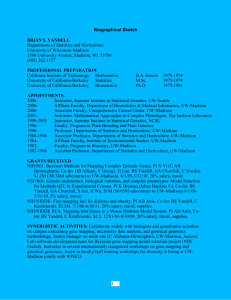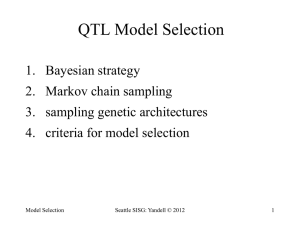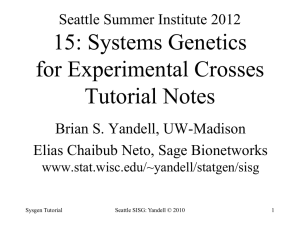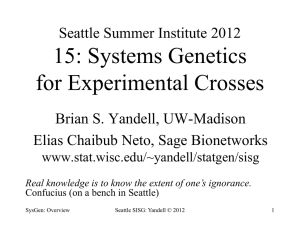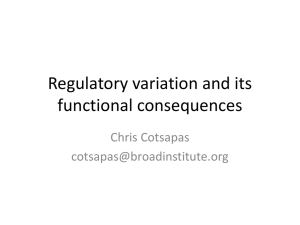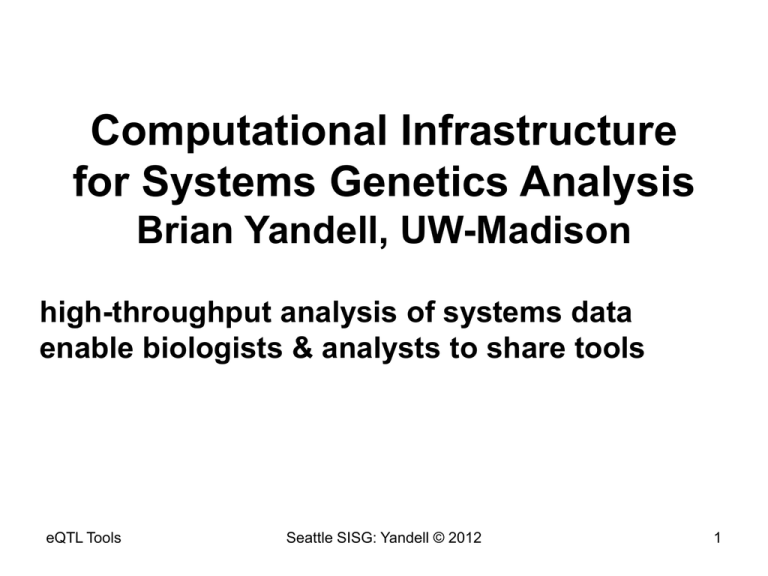
Computational Infrastructure
for Systems Genetics Analysis
Brian Yandell, UW-Madison
high-throughput analysis of systems data
enable biologists & analysts to share tools
eQTL Tools
Seattle SISG: Yandell © 2012
1
www.stat.wisc.edu/~yandell/statgen
byandell@wisc.edu
•
•
UW-Madison
Jackson Labs (HTDAS)
– Gary Churchill
– Ricardo Verdugo
– Keith Sheppard
–
–
–
–
–
–
–
–
–
–
–
Alan Attie
Christina Kendziorski
Karl Broman
Mark Keller
Andrew Broman
Aimee Broman
YounJeong Choi
Elias Chaibub Neto
Jee Young Moon
John Dawson
Ping Wang
–
NIH Grants DK58037, DK66369,
GM74244, GM69430 , EY18869
•
UC-Denver (PhenoGen)
–
–
–
–
•
Boris Tabakoff
Cheryl Hornbaker
Laura Saba
Paula Hoffman
Labkey Software
– Mark Igra
•
U Groningen (XGA)
–
–
–
–
•
Ritsert Jansen
Morris Swertz
Pjotr Pins
Danny Arends
Broad Institute
– Jill Mesirov
– Michael Reich
eQTL Tools
Seattle SISG: Yandell © 2012
2
experimental context
• B6 x BTBR obese mouse cross
– model for diabetes and obesity
– 500+ mice from intercross (F2)
– collaboration with Rosetta/Merck
• genotypes
– 5K SNP Affymetrix mouse chip
– care in curating genotypes! (map version, errors, …)
• phenotypes
– clinical phenotypes (>100 / mouse)
– gene expression traits (>40,000 / mouse / tissue)
– other molecular phenotypes
eQTL Tools
Seattle SISG: Yandell © 2012
3
how does one filter traits?
• want to reduce to “manageable” set
– 10/100/1000: depends on needs/tools
– How many can the biologist handle?
• how can we create such sets?
– data-driven procedures
• correlation-based modules
– Zhang & Horvath 2005 SAGMB, Keller et al. 2008 Genome Res
– Li et al. 2006 Hum Mol Gen
• mapping-based focus on genome region
– function-driven selection with database tools
• GO, KEGG, etc
• Incomplete knowledge leads to bias
– random sample
eQTL Tools
Seattle SISG: Yandell © 2012
4
why build Web eQTL tools?
• common storage/maintainence of data
– one well-curated copy
– central repository
– reduce errors, ensure analysis on same data
• automate commonly used methods
– biologist gets immediate feedback
– statistician can focus on new methods
– codify standard choices
eQTL Tools
Seattle SISG: Yandell © 2012
5
how does one build tools?
• no one solution for all situations
• use existing tools wherever possible
– new tools take time and care to build!
– downloaded databases must be updated regularly
• human component is key
– need informatics expertise
– need continual dialog with biologists
• build bridges (interfaces) between tools
– Web interface uses PHP
– commands are created dynamically for R
• continually rethink & redesign organization
eQTL Tools
Seattle SISG: Yandell © 2012
6
perspectives for building a community
where disease data and models are shared
Benefits of wider access to datasets and models:
1- catalyze new insights on disease & methods
2- enable deeper comparison of methods & results
Lessons Learned:
1- need quick feedback between biologists & analysts
2- involve biologists early in development
3- repeated use of pipelines leads to
documented learning from experience
increased rigor in methods
Challenges Ahead:
1- stitching together components as coherent system
2- ramping up to ever larger molecular datasets
eQTL Tools
Seattle SISG: Yandell © 2012
7
Swertz & Jansen (2007)
eQTL Tools
Seattle SISG: Yandell © 2012
8
collaborative
portal
(LabKey)
systems
genetics portal
(PhenoGen)
iterate many
times
view results
(R graphics,
GenomeSpace
tools)
get data
(GEO,
Sage)
run pipeline
eQTL Tools
Seattle SISG: Yandell © 2012
(CLIO,XGAP,HTD
AS)
9
analysis pipeline acts on objects
(extends concept of GenePattern)
inpu
t
pipeline
outpu
t
setting
s
check
s
eQTL Tools
Seattle SISG: Yandell © 2012
10
pipeline is composed of many
steps
I
A
B
I’
A’
combine datasets
C
compare methods
O
O
’
eQTL Tools
E
D
D’
E’
Seattle SISG: Yandell © 2012
11
alternative path
causal model selection choices
in context of larger, unknown network
focal
trait
target
trait
causal
focal
trait
target
trait
reactive
focal
trait
target
trait
correlated
focal
trait
target
trait
uncorrelated
eQTL Tools
Seattle SISG: Yandell © 2012
12
BxH ApoE-/- chr 2: causal architecture
hotspot
12 causal calls
eQTL Tools
Seattle SISG: Yandell © 2012
13
BxH ApoE-/- causal network
for transcription factor Pscdbp
causal trait
work of
Elias Chaibub Neto
eQTL Tools
Seattle SISG: Yandell © 2012
14
collaborative
portal
(LabKey)
systems
genetics portal
(PhenoGen)
iterate many
times
update
periodically
view results
(R graphics,
GenomeSpace
tools)
get data
(GEO,
Sage)
run pipeline
develop analysis
methods &
algorithms
eQTL Tools
(CLIO,XGAP,HTD
AS)
Seattle SISG: Yandell © 2012
byandell@wisc.edu
15
inpu
t
pipeline
setting
s
outpu
t
check
s
preserv
e
history
package
eQTL Tools
raw
code
Seattle SISG: Yandell © 2012
R&D
16
Model/View/Controller (MVC)
software architecture
• isolate domain logic from input and presentation
• permit independent development, testing,
maintenance
Controller
Input/response
View
system actions
render for
interaction
Model
domain-specific
logic
user changes
eQTL Tools
Seattle SISG: Yandell © 2012
17
eQTL Tools
Seattle SISG: Yandell © 2012
18
eQTL Tools
Seattle SISG: Yandell © 2012
19
eQTL Tools
Seattle SISG: Yandell © 2012
20
automated R script
library('B6BTBR07')
out <- multtrait(cross.name='B6BTBR07',
filename = 'scanone_1214952578.csv',
category = 'islet', chr = c(17),
threshold.level = 0.05, sex = 'both',)
sink('scanone_1214952578.txt')
print(summary(out))
sink()
bitmap('scanone_1214952578%03d.bmp',
height = 12, width = 16, res = 72, pointsize = 20)
plot(out, use.cM = TRUE)
dev.off()
eQTL Tools
Seattle SISG: Yandell © 2012
21
eQTL Tools
Seattle SISG: Yandell © 2012
22
eQTL Tools
Seattle SISG: Yandell © 2012
23
eQTL Tools
Seattle SISG: Yandell © 2012
24
eQTL Tools
Seattle SISG: Yandell © 2012
25
eQTL Tools
Seattle SISG: Yandell © 2012
26



